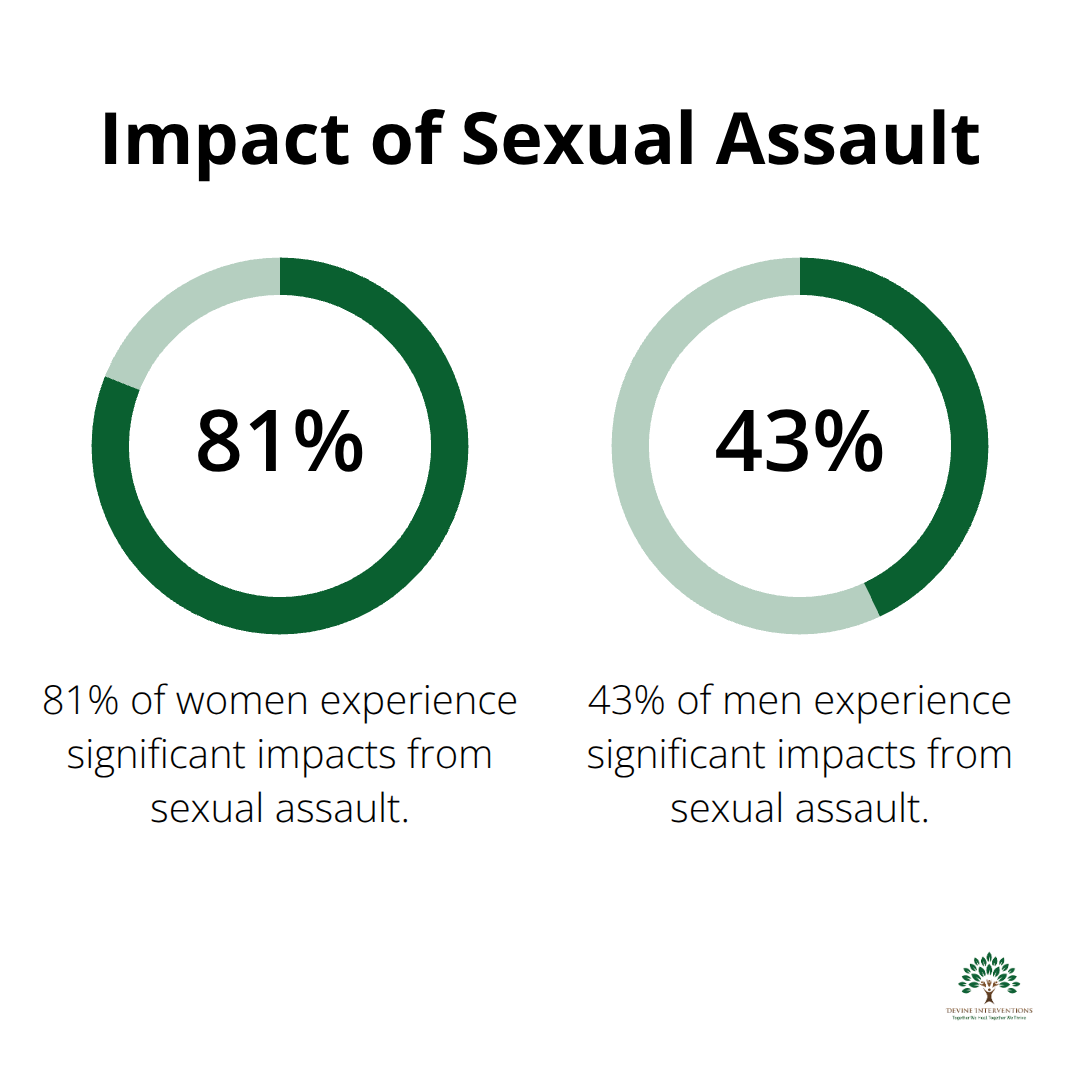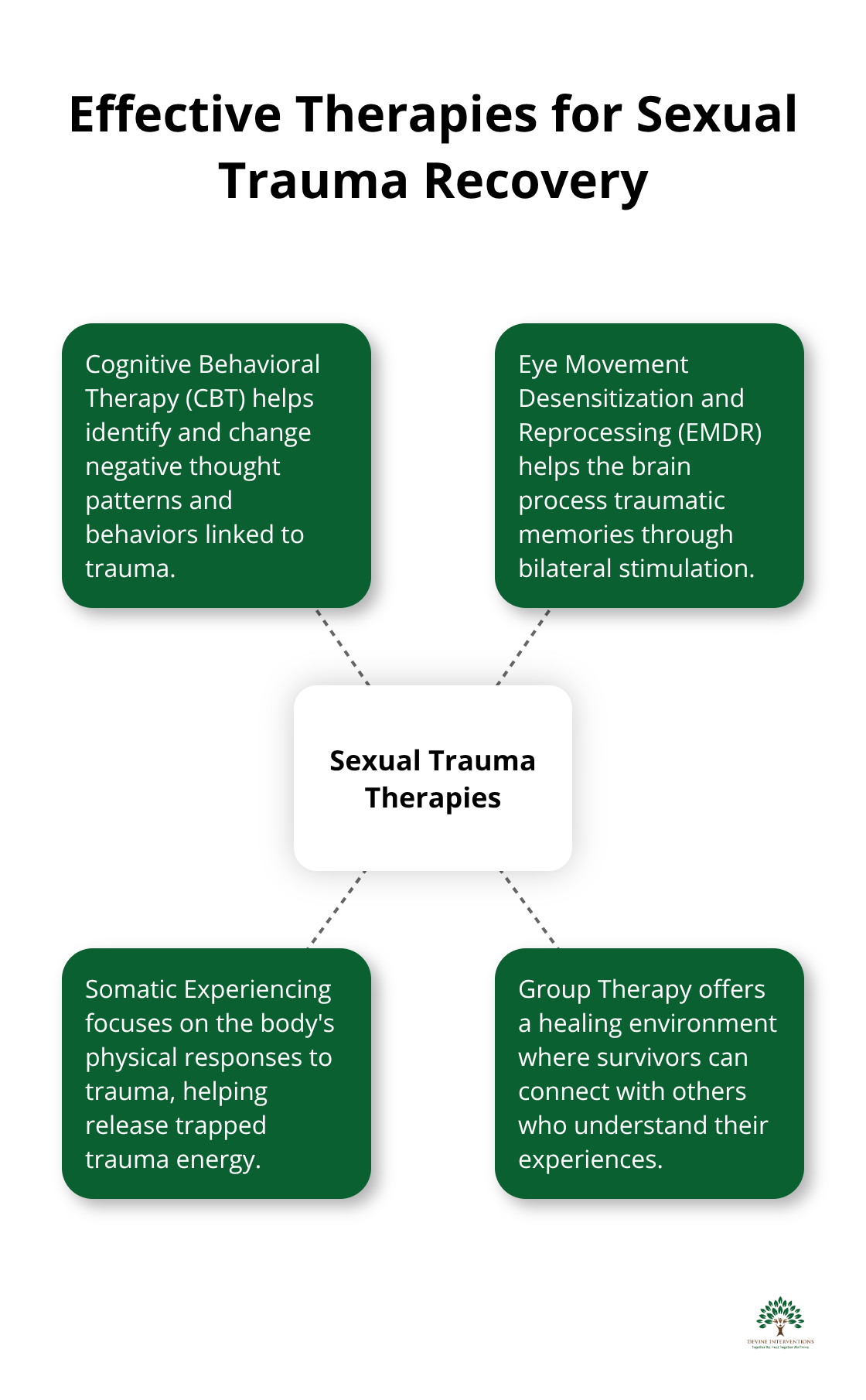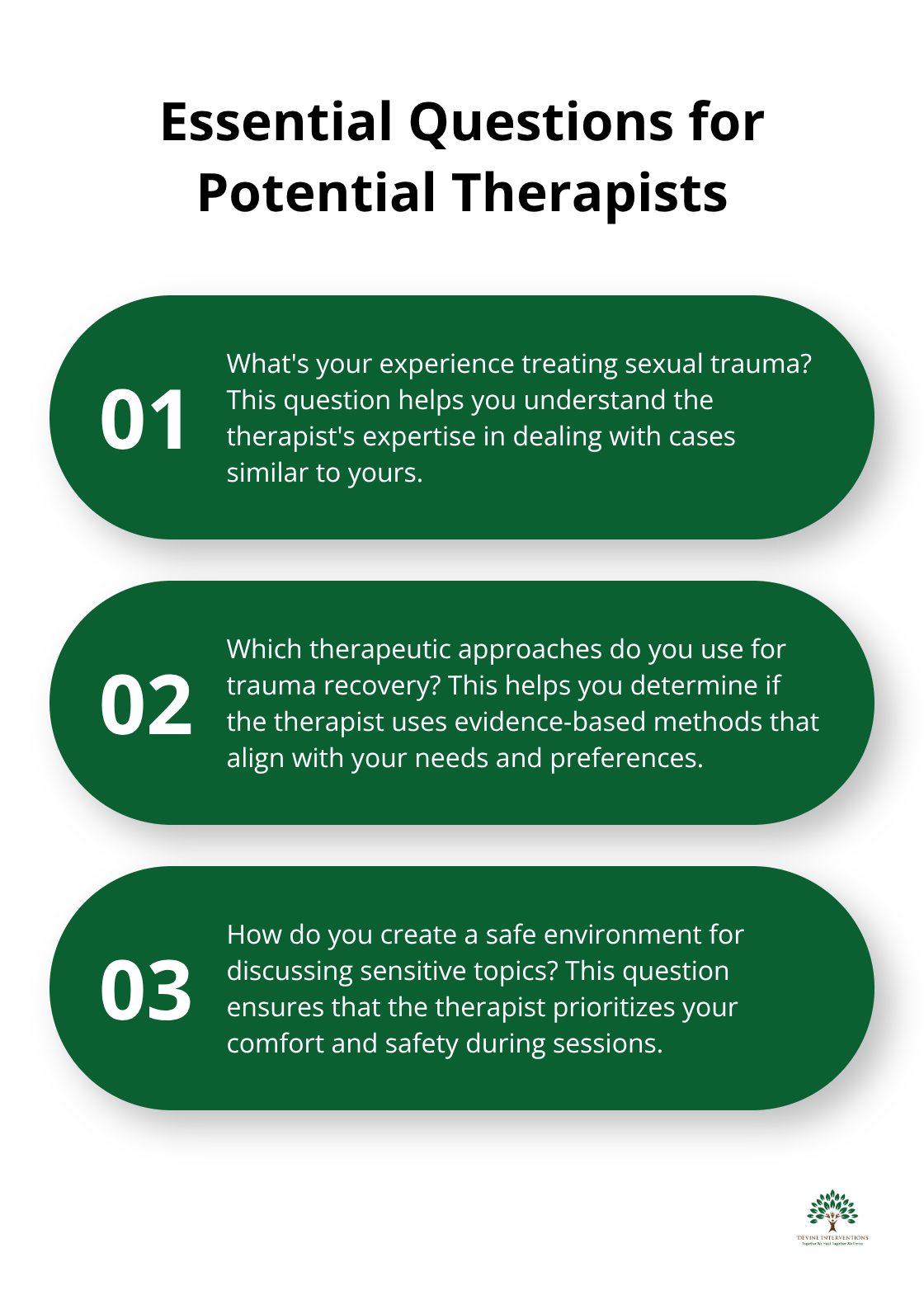Sexual trauma can have profound and lasting effects on a person’s life. At Devine Interventions, we understand the challenges survivors face in their journey towards healing.
Finding the right sexual trauma therapy is a crucial step in reclaiming your life and well-being. This guide will explore effective therapy approaches and provide insights on choosing the right therapist for your unique needs.
What Is Sexual Trauma?
Defining Sexual Trauma
Sexual trauma encompasses any unwanted sexual experience that impacts a person’s mental and physical well-being. This trauma affects individuals of all ages and backgrounds, leaving lasting scars that require professional intervention.
The Psychological Impact
Sexual trauma often inflicts a heavy psychological toll. Survivors frequently grapple with intense feelings of shame, guilt, and self-blame. These emotions can persist and overwhelm. The National Sexual Violence Resource Center reports that 81% of women and 43% of men experience significant short or long-term impacts from sexual assault.

Anxiety and depression commonly plague survivors. Many struggle to form or maintain relationships due to trust issues. Post-traumatic stress disorder (PTSD) frequently occurs, with survivors experiencing flashbacks, nightmares, and intrusive thoughts about the traumatic event.
Physical Manifestations
The effects of sexual trauma extend beyond the psychological realm. Many survivors report chronic pain, headaches, and gastrointestinal issues. Sleep disturbances (such as insomnia or nightmares) often disrupt daily life.
Some individuals develop eating disorders or engage in self-harm as coping mechanisms. Others turn to substance abuse for self-medication. A study in the Journal of Traumatic Stress found that up to 59% of women with substance use disorders report a history of sexual abuse.
Breaking the Silence
One of the most challenging aspects of sexual trauma is the silence that often surrounds it. Fear, shame, or societal stigma prevent many survivors from speaking about their experiences. This silence compounds the trauma and hinders healing.
At Devine Interventions, we create a safe, non-judgmental space for survivors to share their experiences and start their healing journey. Our trauma-informed therapists understand the complexities of sexual trauma and provide the specialized care survivors need.
Healing is possible. With the right support and treatment, survivors can reclaim their lives and find a path forward. If you or someone you know struggles with the effects of sexual trauma, don’t hesitate to reach out. Our team at Devine Interventions offers a range of services tailored to meet the unique needs of sexual trauma survivors.
As we move forward, let’s explore the effective therapy approaches that can help survivors navigate their healing journey and reclaim their lives.
Effective Therapies for Sexual Trauma Recovery
At Devine Interventions, we use a range of evidence-based therapies to help survivors heal from sexual trauma. Each approach targets different aspects of trauma, offering unique benefits to support recovery.

Cognitive Behavioral Therapy (CBT)
CBT forms a cornerstone in trauma treatment. This approach helps survivors identify and change negative thought patterns and behaviors linked to their trauma. Recent research has shown promising results in reducing physical violence through CBT interventions.
In CBT sessions, we work with clients to:
- Recognize harmful thought patterns
- Challenge distorted beliefs about the trauma
- Develop coping strategies for managing triggers
- Face trauma-related fears gradually in a safe environment
Eye Movement Desensitization and Reprocessing (EMDR)
EMDR is a powerful therapy that helps the brain process traumatic memories. During EMDR sessions, clients focus on traumatic memories while following the therapist’s hand movements with their eyes. This bilateral stimulation helps the brain reprocess the trauma, reducing its emotional impact.
Recent studies have shown that EMDR can lead to a decrease in PTSD symptoms, reduced depression symptoms, and increased mental resilience.
Somatic Experiencing
Somatic Experiencing focuses on the body’s physical responses to trauma. This approach helps survivors release trapped trauma energy and regain a sense of safety in their bodies.
In these sessions, we guide clients to:
- Notice bodily sensations related to the trauma
- Learn techniques to regulate their nervous system
- Release stored trauma responses gradually
Group Therapy
Group therapy offers a unique healing environment where survivors can connect with others who understand their experiences. The power of shared experiences can validate and reduce feelings of isolation.
Specialized trauma-focused group therapy sessions provide a safe space for survivors to:
- Share their experiences without judgment
- Learn from others’ coping strategies
- Practice social skills in a supportive environment
- Build a network of peer support
Healing from sexual trauma is a journey, and there’s no one-size-fits-all approach. Each client requires a unique combination of therapies tailored to their specific needs. The next step in your healing journey involves finding the right therapist and creating a personalized treatment plan. Let’s explore how to make this important decision.
Finding Your Ideal Therapist
Qualities of a Trauma-Informed Therapist
When you search for a therapist, focus on professionals with specific training in trauma-informed care. These experts understand the complexities of sexual trauma and provide targeted support. Look for certifications in trauma-specific therapies like EMDR or Somatic Experiencing.
Experience matters. A therapist who has worked extensively with sexual trauma survivors will have a deeper understanding of your unique challenges. They’ll be better equipped to guide you through the healing process.
Essential Questions for Potential Therapists
Before you commit to therapy, ask potential therapists these key questions:

- What’s your experience treating sexual trauma?
- Which therapeutic approaches do you use for trauma recovery?
- How do you create a safe environment for discussing sensitive topics?
- What’s your policy on confidentiality and privacy?
- How do you measure progress in therapy?
These questions will help you determine whether a therapist fits your needs.
Creating Your Personalized Treatment Plan
After you find a therapist, work together to create a treatment plan tailored to your specific needs and goals. This plan should outline:
- Your primary therapy goals
- The therapeutic approaches that will be used
- The frequency and duration of sessions
- Any additional support services you might need
Your plan should evolve as you progress in your healing journey.
The Importance of a Safe Therapeutic Environment
A safe, comfortable therapeutic environment is essential for trauma recovery. Your therapist should create a space where you feel respected, heard, and understood. This might include:
- A private, quiet office space
- Clear boundaries and consistent scheduling
- Respect for your pace and comfort level
- Options for virtual sessions (if needed)
Finding the right therapist and treatment plan takes time and effort, but it’s an important investment in your healing journey. Don’t hesitate to reach out if you need guidance in this process. Some therapists may even incorporate play therapy activities to support healing and growth.
Final Thoughts
Sexual trauma therapy offers a path to healing and reclaiming your life. Cognitive Behavioral Therapy, Eye Movement Desensitization and Reprocessing, Somatic Experiencing, and group therapy provide unique benefits for recovery. Professional help empowers you with tools to process experiences, manage symptoms, and build resilience.
Devine Interventions provides compassionate, trauma-informed care tailored to your needs. Our experienced therapists understand the complexities of sexual trauma and support you throughout your journey. Many survivors have found healing and now lead fulfilling lives.
You possess the inner strength to heal from sexual trauma. Devine Interventions offers various services, from individual therapy to intensive outpatient programs (all designed to support your recovery). Take the first step today towards healing and contact us for support on your path to recovery.







